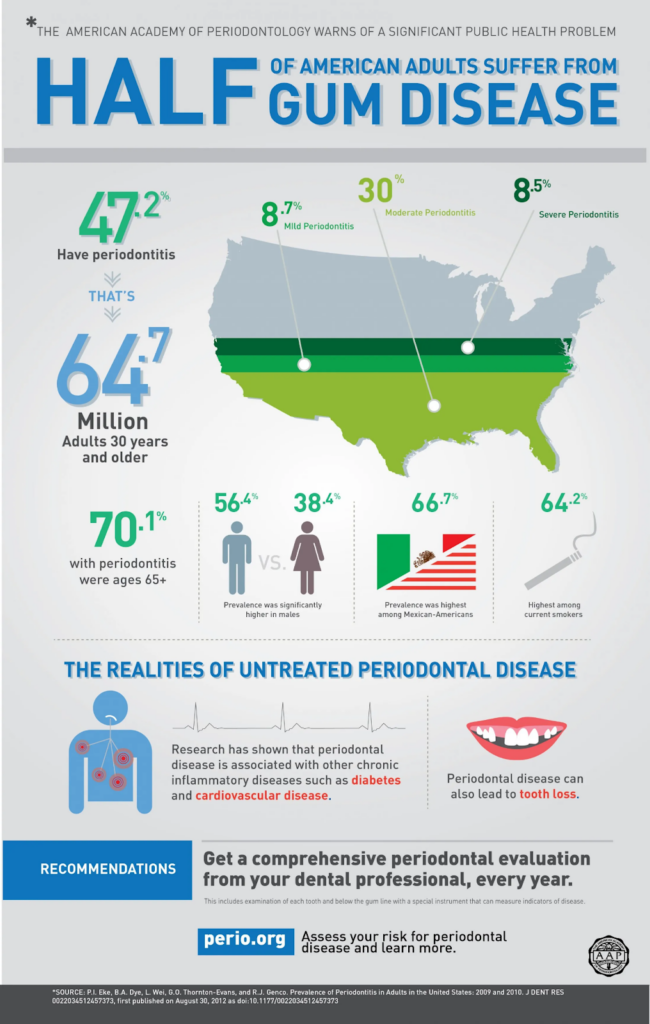PERIODONTAL DISEASE AND YOUR HEALTH
Periodontal disease has been linked to multiple systemic conditions that have been shown to affect your overall health.
CARDIOVASCULAR DISEASE
It’s possible that if you have periodontal disease, you may be at risk for cardiovascular disease…
For a long time we’ve known that bacteria may affect the heart.
Now evidence is mounting that suggests people with periodontal disease – a bacterial infection, may be more at risk for heart disease, and have nearly twice the risk of having a fatal heart attack than patients without periodontal disease.
While more research is needed to confirm how periodontal bacteria may affect your heart, one possibility is that periodontal bacteria enter the blood through inflamed gums and cause small blood clots that contribute to clogged arteries.
Another possibility is that the inflammation caused by periodontal disease contributes to the buildup of fatty deposits inside the heart arteries.
One out of every 5 Americans has one or more types of heart disease. If you are one of these Americans, or if you are at risk for periodontal disease, see a periodontist for a periodontal evaluation – because healthy gums may lead to a healthier body.
DIABETES
The two-way relationship between periodontal disease and diabetes…
For years we’ve known that people with diabetes are more likely to have periodontal disease than people without diabetes.
Recently, research has emerged suggesting that the relationship goes both ways – periodontal disease may make it more difficult for people who have diabetes to control their blood sugar.
More research is needed to confirm how periodontal disease can make it more difficult to control blood sugar. What we do know is that severe periodontal disease can increase blood sugar, contributing to increased periods of time when your body functions with a high blood sugar. And, as a diabetic, you know that this puts you at increased risk for diabetic complications. In other words, controlling your periodontal disease may help you control your diabetes.
If you are among the nearly 16 million Americans in the U.S. who live with diabetes, or are at risk for periodontal disease, see a periodontist for an evaluation – because healthy gums may lead to a healthier body.
PREGNANCY
It’s possible that if you have periodontal disease and are pregnant, you may be at risk for having a premature, low birthweight baby…
For a long time we’ve known that many risk factors contribute to mothers having babies that are born prematurely at a low birthweight – smoking, alcohol use, drug use and infections.
Now evidence is mounting that suggests a new risk factor – periodontal disease. Pregnant women who have periodontal disease may be seven times more likely to have a baby that is born too early or too small.
More research is needed to confirm how periodontal disease may affect pregnancy outcomes. What we do know is that periodontal disease is an infection and all infections are cause for concern among pregnant women because they pose a risk to the health of the baby.
If you are planning to become pregnant or are at risk for periodontal disease be sure to include a periodontal evaluation with a periodontist as part of your prenatal care – because healthy gums may lead to a healthier body and a healthy baby.
RESPIRATORY DISEASE & PERIODONTAL DISEASE
It’s possible that if you have periodontal disease, you may be at risk for respiratory disease…
For a long time we’ve known that people who smoke, are elderly, or have other health problems that suppress the immune system, are at increased risk for the development of respiratory diseases like pneumonia, bronchitis, emphysema and Chronic Obstructive Pulmonary Disease.
More research is needed to confirm how periodontal disease may put people at increased risk for respiratory disease. What we do know is that infections in the mouth, like periodontal disease, are associated with increased risk of respiratory infection.
If you are at risk for respiratory disease or periodontal disease see a periodontist for a periodontal evaluation – because healthy gums may lead to a healthier body.


